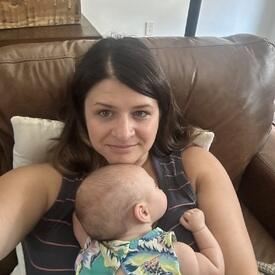Starvation mode: fact or fiction?

daisabelle
Posts: 74 Member
Just read an interesting article:
http://www.weightwatchers.co.uk/util/art/index_art.aspx?tabnum=1&art_id=29241
What are your thoughts?
http://www.weightwatchers.co.uk/util/art/index_art.aspx?tabnum=1&art_id=29241
What are your thoughts?
0
Replies
-
I don't know if it exists or not. What I do know is that if I consistently eat less than 1200 cals a day, my body gets used to that and it's hard to maintain on that small amount of food. I'd rather have a metabolism that works efficiently. If I'm hungry, I will overeat. If I'm satisfied, I can maintain my eating habits.0
-
Based on my own personal experience, I believe it is a fact.0
-
I agree. If I'm over hungry, I'll eat just about anything and everything!0
-
it definitely exists. when i was at my lowest weight, if i ate more than an apple and a salad in a day, i'd gain weight. now i'm eating 1500 calories a day and maintaining.0
-
Where is the science? That is what I was thinking when I read the article. It seems antidotally that when people DON'T EAT ENOUGH that they hold onto the weight as well as numerous dieticians and physical fitness experts are strongly encouraging people to not go below 1200 calories- are they espousing a myth? I rather eat well and have energy, exercise and take off my weight slowly and steadily.0
-
There are lots of variables that can cause an apparent plateau.
My understanding is that if you are in conservation (don't use starvation) mode, you retain water because your body is trying to stabilize your weight, but that this can't last forever. If you're under your maintenance calories every day, you will lose weight provided you're not eating all the calories you're spending.
This is really really annoying because after you've lost a big amount of initial weight (and lots of us have dramatic losses at first), then you're down to the 1 lb per week, and the weight loss is undramatic. It's discouraging to see an increase after a week, but remember that in the long run, those numbers go down if you stick to it. That increase might be fecal matter (eat your fibre!) or TOM (drink your water!) or conservation mode (drink enough water! eat enough food! stay on track!). It goes away.0 -
I have actually done a PSMF.....protein sparing modified fast....actually the one by lyle mcdonald...it works....but isn't meant to be sustained for a long period of time.....did my metabolism slow down?...I don't know because I used stimulants to make sure it didn't slow down......extremely LOW calorie diets work...this I know...but really aren't healthy for use as a lifetime change....research lyle mcdonald....I found him interesting...and very knowledgeable on nutrition!
Rob0 -
I think that the body is a complex machine and trying to reduce it down to over simplified rules isn't a great strategy overall. I'm sure that there is truth to the slowing of metablic rate with a reduced diet but it is also what you're eating and overall nutrients that you're taking in and how active you are.0
-
In my experience there's definitely a starvation mode. In fact I wrote a blog post that touched on that earlier this week. Years ago I decreased my calorie intake and increased my exercise because I wasn't losing weight anymore, did it to the point where I was eating 500-800 calories a day and exercising for 3 hours. I not only still didn't lose any more weight but nearly ended up in the hospital. And when I was so sick that I literally could barely eat and was living off only broth and diet jello I gained 10 pounds in 2 weeks because I couldn't do any exercise. Between that and having my doctor tell me that I came -> <- that close to ending up in the hospital, all because of what I was doing, was a serious reality check.0
-
all I know is, for me I lose more the more I eat. That doesn't mean 3000 cals a day, I eat any where between 1200-1500 cals a day. I only eat more than 1200 if I exercised that day. At one point I ate about 1100 cals a day ( 2 meals a day) and I stopped losing weight. GL0
-
I currently I know someone who is consulting with a whole medical team to consider water fasting for perhaps as long as a year. This person is heavier than several of us combined and I do not advise this without the kind of medical support he will have.
I have today lost 65 pounds lowering my calories to equal 2 to 3 pounds per week, the math can be worked out on your goal settings. For some months now I have been below the 1200 figure usually mentioned.
I am sedentary. I am short. I am female.
The BMR at my goal weight is less than 1200 calories. So according to that decades old study, what is that supposed to mean?
Yes, yes I hear the cry of the exercisers, and yes I will walk etc at some point.
For now I keep tweeking my calorie figures, I eat the most nutritious foods I can and I am losing steadily.
I weigh everything, everything, everything. I log each meal before I eat it.
I do not have a day off each week.
The holidays set me back 3 lbs, but once back on the plan the weight is coming off again.
The downside: I am totally consumed with myself. I wake each morning, weigh-in and log on to MFP, I check in if I have had a loss, adjust my calorie goals, and start to plan my food day. I leave the site up all day logging each cup of water, each gram of food, and check my community postings frequently.
I do not have to cook for others or deal with a job or children, been there done that. For those of you with more complicated lives you have my sincere sympathy.
The industrial food system has been addicting us for years on their fat-salt-sugar regime. What other addiction says have only one cigarette, one drink, one dose of drugs per day.
Food must be eaten. But we need to change the brain big time to repair and retrain our eating habits and appetites.
Thank you for the link, I must say I have found the starvation mode thing a myth too. My experience is anecdotal yes, but I don't care.0 -
It seems to me that if "starvation mode" really exists then no one would ever lose weight, and people wouldn't really be starving. People do lose weight and people are definitely starving. I think it's like someone else wrote, the human body is a complex machine. It most definitely does what it has to, to survive. And most likely this is a different experience for everyone. It seems to me that perhaps it's more like a temporary state. That at some point your body is going to take the fat and use it for survival, so I don't see at all how "starvation mode" would last for long.
For example, those folks that go on "Survivor" are really losing up to 30 lbs in less than 40 days. If anyone would be going into "starvation mode" it would be them. But yet they drop a lot of weight in a very short period of time. And while they do physical activity approximate every other day, it is not usually for extended periods of time, and the rest of the time they are conserving for the most part. Are they getting sick? Absolutely, and I wouldn't recommend trying that at home. But my point is that "starvation mode" doesn't seem to be kicking in for them. Maybe it is and if it didn't they would lose more...IDK. They do experience a greatly reduce caloric intake compared to what most of us do, but still.
So I think for the most part it's a myth. I think it happens initially at first for a short period of time, but then the body moves to protect itself further by using up fat and whatever else it needs to keep the organs functioning as best as possible.0 -
IMO, the use of both terms--"starvation mode" and "myth" are imprecise and lead to misunderstandings.
The author uses the term "myth" because it has more of an impact than "overused". But I think it can still be misleading.
My experience is that, while not a "myth' per se, true "starvation mode" is something that few people will ever experience. Most "plateaus" in weight loss are due to the interplay of a number of factors, the most frequent being that people underestimate their caloric intake. And there can be a varied response to a low calorie intake, which complicates things even more.0 -
It seems to me that if "starvation mode" really exists then no one would ever lose weight, and people wouldn't really be starving. People do lose weight and people are definitely starving. I think it's like someone else wrote, the human body is a complex machine. It most definitely does what it has to, to survive. And most likely this is a different experience for everyone. It seems to me that perhaps it's more like a temporary state. That at some point your body is going to take the fat and use it for survival, so I don't see at all how "starvation mode" would last for long.
For example, those folks that go on "Survivor" are really losing up to 30 lbs in less than 40 days. If anyone would be going into "starvation mode" it would be them. But yet they drop a lot of weight in a very short period of time. And while they do physical activity approximate every other day, it is not usually for extended periods of time, and the rest of the time they are conserving for the most part. Are they getting sick? Absolutely, and I wouldn't recommend trying that at home. But my point is that "starvation mode" doesn't seem to be kicking in for them. Maybe it is and if it didn't they would lose more...IDK. They do experience a greatly reduce caloric intake compared to what most of us do, but still.
So I think for the most part it's a myth. I think it happens initially at first for a short period of time, but then the body moves to protect itself further by using up fat and whatever else it needs to keep the organs functioning as best as possible.
My take on this is that when you're in starvation mode, you still burn calories, just much slower. Those people are likely eating so little that they are still losing weight. In other cases, your metabolism will slow down but you are still eating enough to maintain.
Nobody ever says that if you starve yourself you won't lose weight, that's why the term "starvation mode" is a little misleading. Whoever used the term "conservation mode" is probably closer to what's actually happening. Your body doesn't necessarily think it is starving, but if it is not getting enough fuel it may start conserving energy however it knows how.0 -
Let me throw out some logic (my thoughts) here...Just to tickle the brain.

So those who do eat below 1200 calories and are apparently gaining or maintaining weight, what are they eating? I bet you $100 bucks it is a LOT of carbs and processed sugary/salty snacks and other processed crap that grocery stores and corporate businesses trick us into thinking is ‘healthy’ to eat; thus it is no wonder people 'hold onto their fat/weight'.
Personally I believe in eating only when you are hungry and eat all the good natural foods you want until you feel satisfied! I don't eat processed foods or sugar snacks other than fruit and the occasional coconut milk ice cream. I eat all the organic veggies and meats I want. Some days I may eat only 500 cal and some days I may be over 1200 cal, yet I still maintain my weight and continue to increase my lean muscle mass. So, for me anyways, this is a myth.0 -
I lost faster at 1350 than I did at 1200 in my time on MPF. And I eat the majority of my exercise calories back
About five years ago, I didn't know what I was doing, and was probably only eating about 700 a day, and lost weight incredibly slowly. At absolute MOST a half pound a week. It was so slow that I decided, "I can eat what I want, and stay in a healthy range. Why am I starving myself to try to be 10 pounds less than that?" At that time, eventually I lost about 15 pounds, getting to about 130. I slowly crept back up to a comfortable 145 - which is probably my body's happy weight that requires no maintenance - then after losing my parents and suffering from depression, added another 15 pounds.
I'm currently 135, and smaller than I was five years ago at 130, with less body fat and more muscle tone. One of the reasons I hadn't tried to lose any weight between then and now was because even when I lost weight, I still had mushy thighs and rolls of back fat. I thought that was here to stay. But the problem was that I wasn't losing weight right. I was losing muscle and fat because I wasn't eating enough and wasn't exercising. There's no way I could have the strength and endurance I have now on so little food. I need more fuel to exercise the way I do.0 -
If if there's no starvation mode, then how do you explain eating disorders? There obviously IS a point where bodily functions (heart, liver, renal) begin to deteriorate, expecially after long periods of time. Buliemia and anorexia are extreme cases of such. It's a slow slope into the extreme...but dangerous nonetheless.0
-
There is a point where you're starving, but a lot of things go into what is called "starvation mode". Some people eat really low calories, lose tons of weight, then gain it back when they return to "normal" eating. But their "normal" eating habits are what caused them to be overweight in the first place, so they gain it all back because they haven't developed healthy eating habits. Or it could be that they go low, then binge and eat everything in the fridge and then some.
Does your metabolism slow down when you reduce calories? Yes. An overweight person has a faster metabolism than a slimmer person, so as you lose weight, your metabolism slows down.
And every body is different. I don't lose weight on 1600 calories - I have to go down to about 1200. I've survived fine on 1000 with tons of energy and good weight loss. (I also can't do the recommended 5-6 small portions per day: I have to do two large meals, with some calories left over for snacking.)
So there are a lot of variables that go into weight loss, and I think the whole "starvation mode" thing is just another attempt at a quick-fix explanation.0
This discussion has been closed.
Categories
- All Categories
- 1.4M Health, Wellness and Goals
- 397K Introduce Yourself
- 44.2K Getting Started
- 260.9K Health and Weight Loss
- 176.3K Food and Nutrition
- 47.6K Recipes
- 232.8K Fitness and Exercise
- 456 Sleep, Mindfulness and Overall Wellness
- 6.5K Goal: Maintaining Weight
- 8.7K Goal: Gaining Weight and Body Building
- 153.3K Motivation and Support
- 8.3K Challenges
- 1.3K Debate Club
- 96.5K Chit-Chat
- 2.6K Fun and Games
- 4.5K MyFitnessPal Information
- 16 News and Announcements
- 18 MyFitnessPal Academy
- 1.4K Feature Suggestions and Ideas
- 3.1K MyFitnessPal Tech Support Questions














